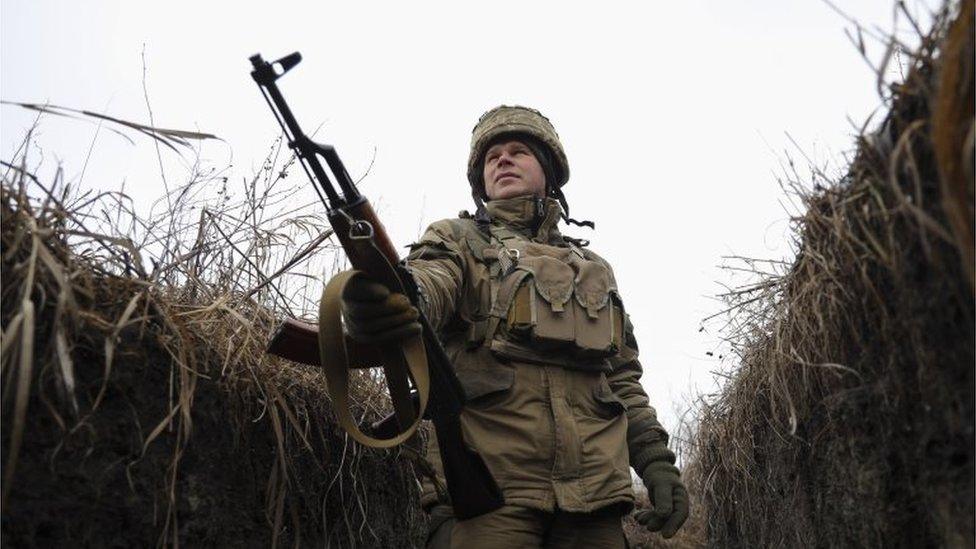Ukraine crisis: Human cost of Russia attack would be immense - Biden
- Published
Watch: "The US will defend every inch of Nato territory."
A Russian attack on Ukraine is "still very much a possibility" and the human cost would be "immense", US President Joe Biden has said.
In remarks televised nationally, he said the US was ready to respond decisively to such a move.
Mr Biden said Russia had massed some 150,000 troops on Ukraine's borders.
Russia says it is pulling back some of its troops. On Wednesday, it announced that military drills in Moscow-annexed Crimea had ended.
"Units of the Southern Military District, having completed their participation in tactical exercises, are moving to their permanent deployment points," the defence ministry said in a statement, without detailing how many troops were leaving.
Footage broadcast on state television appeared to show military vehicles crossing the bridge to leave Crimea.
But Western leaders remain wary, with Nato saying there were no signs yet of a de-escalation.
"On the contrary," secretary-general Jens Stoltenberg said, "it appears that Russia continues their military build-up".
His comments, ahead of a meeting of the military alliance's defence ministers, echoed Mr Biden's remarks on Tuesday, when he said Russia's withdrawal "would be good" but had not yet been verified.
"Indeed, our analysts indicate that they remain very much in a threatening position," the president said.
Video released by Russia's defence ministry appears to show tanks crossing the Crimean Bridge
Also on Tuesday, Ukraine said the websites of its defence ministry and two banks came under a cyber-attack. The cause is not clear but Ukraine has suffered large-scale attacks before on its online infrastructure and has pointed the finger at Russia.
Russia's government, however, has denied any involvement.
There has long been concern that, rather than a full-scale invasion, Russia could use less obvious means to destabilise Ukraine, for example through cyber-attacks on critical infrastructure. President Biden said the US was prepared to respond to any such move.
ON THE GROUND: Ukrainians wary of Russian claims of withdrawal
ANALYSIS: Is Russia going to invade Ukraine?
Mr Biden's speech came hours after Russian President Vladimir Putin said Moscow's security concerns should be addressed and taken seriously.
Mr Putin has always denied planning an incursion, and said Russia did not want another war in Europe. However, tensions have been rising since November.
Following earlier reports that US intelligence believed Russia could attack Ukraine on Wednesday, Ukrainian President Volodymyr Zelensky declared it to be a day of unity, calling on citizens to wave the country's flag and wear blue and yellow ribbons - Ukraine's national colours.


Russia has deep cultural and historic ties with Ukraine, which is a former Soviet republic.
Mr Putin wants assurances that it will not join Nato because he sees any expansion of it as a threat to Russia. Nato has rejected that demand.
Mr Biden said he agreed with a proposal by the Russian government to continue diplomacy.
The US president also warned the American economy could suffer from disruption to energy supply and sharp price increases in the likely event that sanctions were levied on Russia in response to any invasion of Ukraine.
"The American people understand that defending democracy and liberty is never without cost," the US president said. "I will not pretend this will be painless."
He said the administration was working on contingency plans with energy producers and shippers to avert potential supply issues.
Mr Biden warned the proposed Russian Nord Stream 2 natural gas pipeline to Europe "will not happen" if a Ukraine invasion goes ahead.
The US president continued: "To the citizens of Russia: you are not our enemy, and I don't believe you want a bloody, destructive war against Ukraine."
Nato expressed "cautious optimism" on Tuesday about the Russian military's announcement that it had pulled back some of its troops from the border with Ukraine.
US Secretary of State Antony Blinken told his Russian counterpart Sergei Lavrov in a call that the US needed to see "verifiable, credible, meaningful de-escalation".
Earlier, British Prime Minister Boris Johnson tweeted that there were "mixed signals" coming from Russia, because UK intelligence showed Russian field hospitals were being built near the border which could "only be construed as a preparation for an invasion".


Vladimir Putin said on Tuesday that Russia did not want war. He spoke following a four-hour meeting with German Chancellor Olaf Scholz.
Mr Putin also said Nato had so far failed to address Russia's "basic" security concerns. He is demanding that the issue of Ukraine joining Nato be addressed now, even through Ukraine is a long way from even starting an application to join the alliance.
Mr Scholz said at the joint press conference that the build-up of Russian troops was "incomprehensible", but there was still a chance that diplomatic solutions could ease the tensions.
"I expressed that the troop build-up is seen as a threat," Mr Scholz said at a media briefing. "Of course we are very concerned."
Related topics
- Published16 February 2022
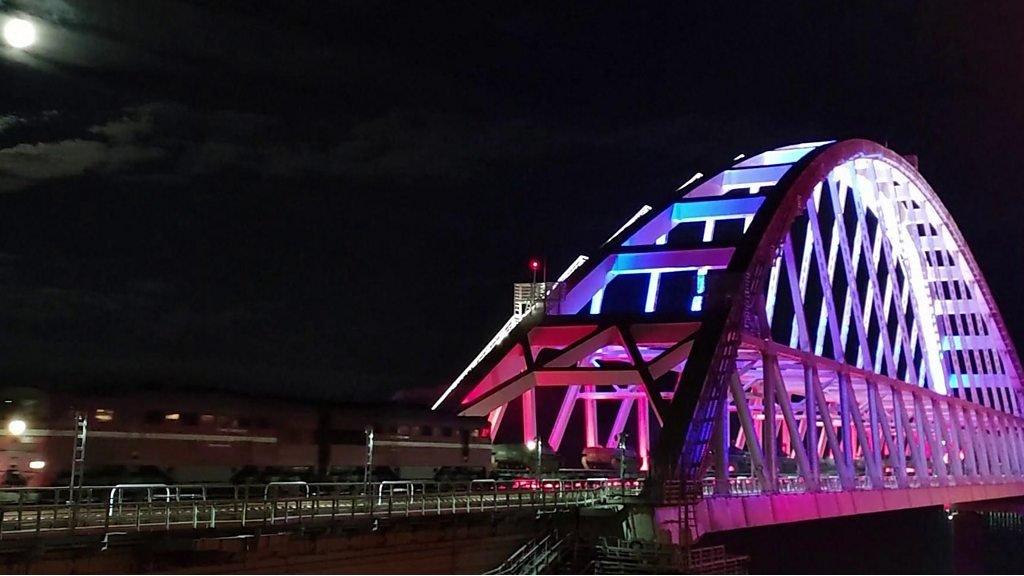
- Published24 February 2023
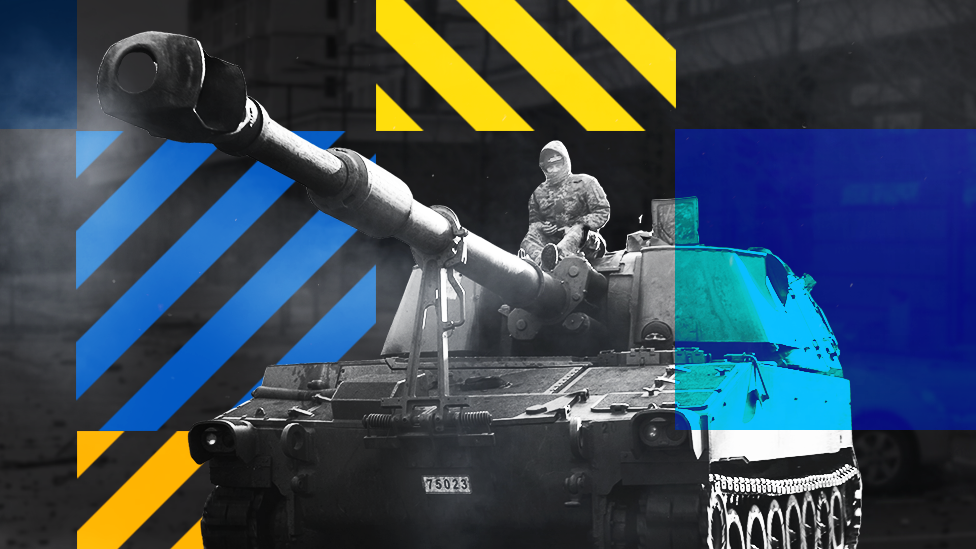
- Published14 February 2022
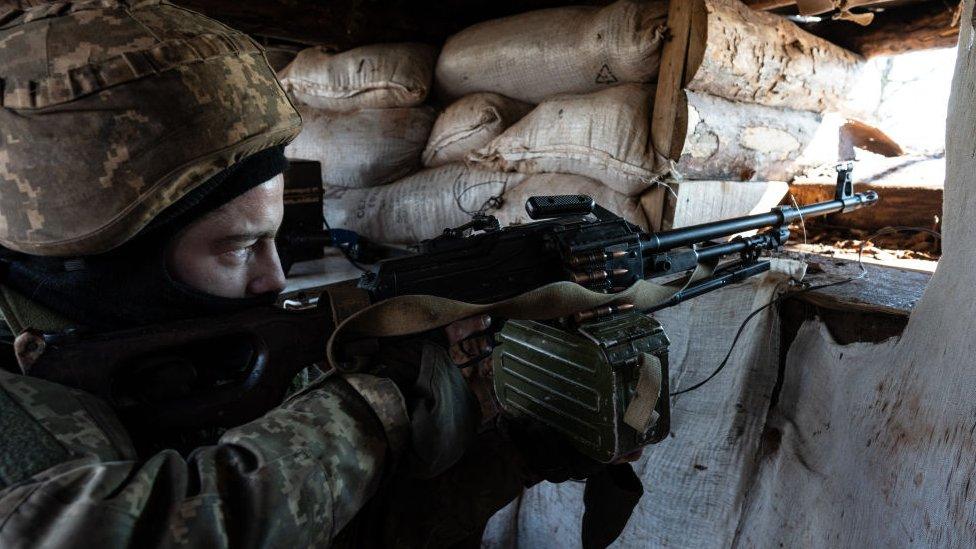
- Published13 February 2022
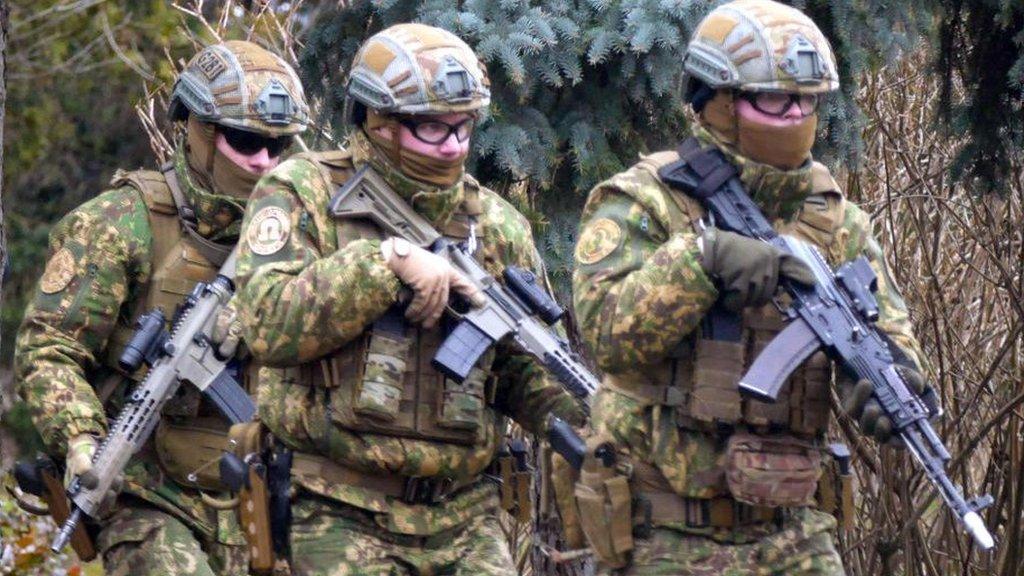
- Published10 February 2022
